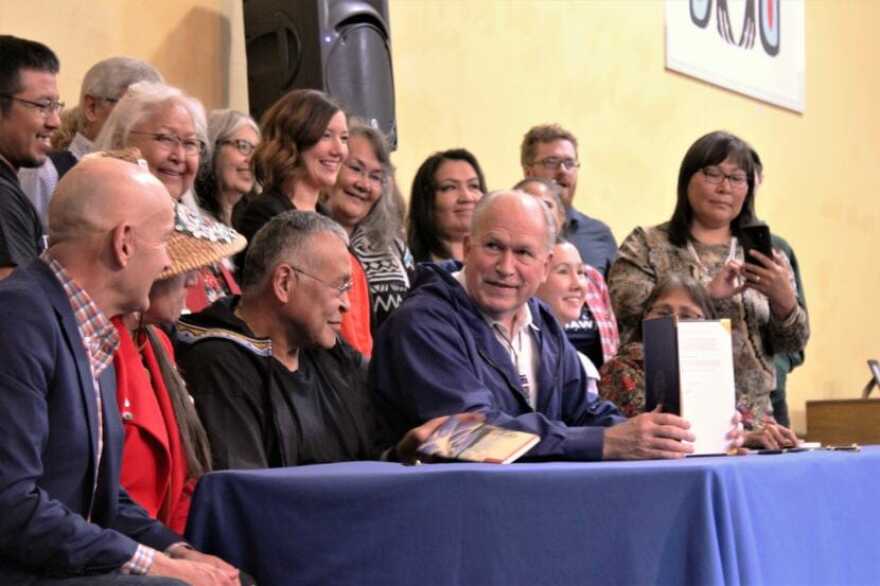Gov. Bill Walker signed an administrative order Sunday in Juneau officially declaring a linguistic emergency for Alaska Native languages.
The order recognizes the threat faced by Indigenous languages and takes steps to revitalize them by directing state agencies to work more closely with tribal partners and use traditional place names on state signs.
Language advocates from across Alaska gathered Sunday at the Juneau Arts and Culture Center to celebrate a milestone in Indigenous language revitalization.
The signing ceremony for Administrative Order 300 took place at a welcome reception for the First Alaskans Institute’s Social Justice Summit.
Central Council of Tlingit and Haida Indian Tribes of Alaska President Richard Peterson was one of several Southeast Alaska Native representatives who welcomed attendees.
“If you live in Juneau, you hear a lot of what Dr. Soboleff had said and you hear this a lot and it’s true: when we know who we are, we don’t hurt ourselves,” Peterson said. “When we know our language and our cultures, we don’t hurt ourselves.”
Peterson described his own experience struggling with addiction growing up in Kasaan, experiencing some of the issues young people deal with in Native communities around the state.
“You carry shame,” Peterson said. “But it was always my culture where I was able to let go of shame and know who I am.”
Leaders like Peterson hope that Administrative Order 300 will help communities across the state reconnect with their culture in a meaningful way.
In a report last year, the Alaska Native Language Preservation and Advisory Council warned that all 20 officially recognized Alaska Native languages are at risk of extinction by the end of this century.
The order requires state commissioners to designate a tribal liaison responsible for producing a plan to better collaborate with Alaska Native partners.
It specifically directs the commissioner of the Department of Education and Early Development to work with partners to promote Indigenous languages in public education.
The administrative order also directs the state to use traditional Alaska Native place names on public signage going forward.
The order came about following April’s passage of House Concurrent Resolution 19, sponsored by Ketchikan Rep. Dan Ortiz.
That resolution urged Gov. Bill Walker to declare a language emergency for Alaska Native languages.
“You know there’s not a lot of times I stand up in front of a microphone and thank the Legislature and I certainly do on this,” Walker said Sunday.
Walker applauded the work of groups like the First Alaskans Institute and the many individuals who testified and worked on behalf of language revitalization.
“You can talk all you want, but somebody has to be the doer. And that’s really what today is about, is we celebrate the many doers that made this happen,” Walker said.
Walker also acknowledged the role the state of Alaska played in undermining and discouraging the use of Indigenous languages in previous generations.
“I know we need to celebrate where we are, but boy, if you don’t reflect on where you’ve been, it really is only part of the discussion, part of the celebration,” Walker said.
Of the Alaska Native languages addressed by the order, one has already lost its last native speaker.
The last fluent speaker of Eyak died 10 years ago, according to the Native language preservation council.

